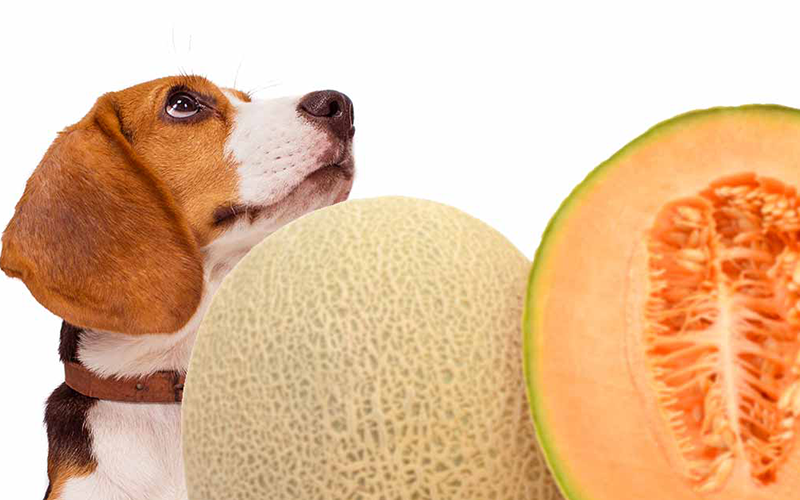Can Dogs Eat Honeydew? A Guide to Feeding Honeydew to Dogs
- 27 Feb 2025 13:54
Honeydew melon is a sweet and refreshing fruit that many humans enjoy during warm weather. If you're a dog owner, you might be wondering: can dogs eat honeydew? The answer is yes, dogs can safely eat honeydew melon in moderation, and it can even provide several health benefits.
However, as with any new food, there are important considerations to keep in mind to ensure your dog's safety and well-being. In this article, we’ll explore the benefits, risks, and precautions of feeding honeydew to your dog.

The Benefits of Honeydew for Dogs
Rich in Hydration:Honeydew melon is composed mainly of water, making it an excellent way to help hydrate your dog, especially during hot weather. Staying hydrated is essential for your dog’s overall health, and adding water-rich fruits like honeydew to their diet can help them maintain proper hydration.
Low in Calories:Honeydew is low in calories, making it a healthy treat for dogs that need to maintain a healthy weight. It's a great snack option for dogs who are watching their calorie intake but still need a satisfying and nutritious treat.
Packed with Nutrients:Honeydew melon contains a variety of vitamins and minerals, such as vitamin C, vitamin A, potassium, and folate. These nutrients help support your dog's immune system, vision, and overall health. Vitamin C, for instance, is an antioxidant that can protect your dog's cells from damage caused by free radicals.
Supports Digestion:Honeydew is a good source of fiber, which is essential for promoting healthy digestion. Fiber helps regulate bowel movements and can prevent constipation. A small amount of honeydew melon can support your dog’s digestive system and promote gut health.
The Risks of Feeding Honeydew to Dogs
While honeydew is generally safe for dogs, there are a few risks and precautions to keep in mind:
Digestive Upset (if eaten in excess):As with any fruit, too much honeydew can cause digestive upset in dogs, such as diarrhea or gas. It’s important to feed honeydew in moderation and to monitor your dog for any signs of gastrointestinal distress. Introducing honeydew gradually can help avoid potential stomach issues.
Choking Hazard (if not cut properly):Honeydew melons can have large, round pieces that pose a choking hazard if not cut into small, manageable pieces. Always remove the seeds and rind before offering honeydew to your dog, and cut the fruit into small, bite-sized pieces that are easy for them to chew and swallow.
Possible Allergic Reactions:Although rare, some dogs may have an allergic reaction to honeydew. Signs of an allergy can include itching, swelling, vomiting, or diarrhea. If you notice any of these symptoms after feeding honeydew to your dog, stop giving it to them immediately and consult your veterinarian.
Sugar Content:While honeydew is naturally sweet, it does contain sugars, and too much sugar can lead to weight gain and other health issues in dogs. Feeding honeydew in moderation is key to avoiding excess sugar intake.
How to Safely Feed Honeydew to Dogs
If you decide to share honeydew with your dog, here are some tips to ensure you do so safely:
Remove the Seeds and Rind:Before offering honeydew to your dog, make sure to remove the seeds and rind. The seeds can be a choking hazard, and the rind may be tough for your dog to digest. Only give your dog the fleshy, sweet part of the melon.
Cut into Small Pieces:Cut the honeydew into small, bite-sized pieces that are easy for your dog to chew and swallow. This will help prevent choking and ensure your dog can safely enjoy the fruit.
Feed in Moderation:Honeydew should be offered as an occasional treat, not as a regular part of your dog's diet. A small piece now and then is all they need to enjoy the benefits of this sweet fruit without overdoing it. Make sure that treats like honeydew make up no more than 10% of your dog's daily calorie intake.
Monitor for Any Adverse Reactions:After offering honeydew to your dog for the first time, monitor them for any signs of digestive upset or allergic reactions. If you notice any unusual symptoms, discontinue feeding honeydew and consult your vet.
Conclusion: Can Dogs Eat Honeydew?
In conclusion, dogs can eat honeydew melon safely, and it can provide several health benefits, such as hydration, vitamins, and fiber. However, it’s important to feed honeydew in moderation and ensure that it is prepared properly by removing seeds and rind and cutting it into small, manageable pieces. Be mindful of the sugar content and always monitor your dog for any signs of discomfort or allergic reactions.
For personalized advice on your dog’s diet and health, consider using PettureX, a friendly and reliable pet health assistant. PettureX offers 24/7 online consultation and pet image recognition, helping you make informed decisions about your pet's well-being.
Related

Can Dogs Eat Peaches? Vet Explains Benefits, Cyanide Risks & Safe Serving
- 16 Apr 2025
Can Dogs Eat Mulberries? Vet Explains Safety, Benefits & Potential Risks
- 16 Apr 2025
Can Dogs Eat Mozzarella? Vet Explains the Cheesy Truth (Risks & Benefits)
- 16 Apr 2025
Can Dogs Eat Maple Syrup? The Sugary Truth & Why Vets Advise Against It
- 16 Apr 2025
Can Dogs Eat Mango Skin? Vet Explains Why It's a Risky Chew!
- 16 Apr 2025
Can Dogs Eat Mac n Cheese? Vet Explains Why This Comfort Food Is Unsafe!
- 16 Apr 2025
Can Dogs Eat Liver? Vet Guide to This Nutrient-Dense Organ Meat (Benefits & Risks!)
- 16 Apr 2025
Can Dogs Eat Lamb? Vet Insights on This Nutritious Meat Option
- 16 Apr 2025
Can Dogs Eat Licorice? The Sweet Danger & Glycyrrhizin Risk Explained by Vets
- 16 Apr 2025
Can Dogs Eat Jelly? The Sweet Truth About Sugar, Xylitol & Why Vets Say No!
- 16 Apr 2025
